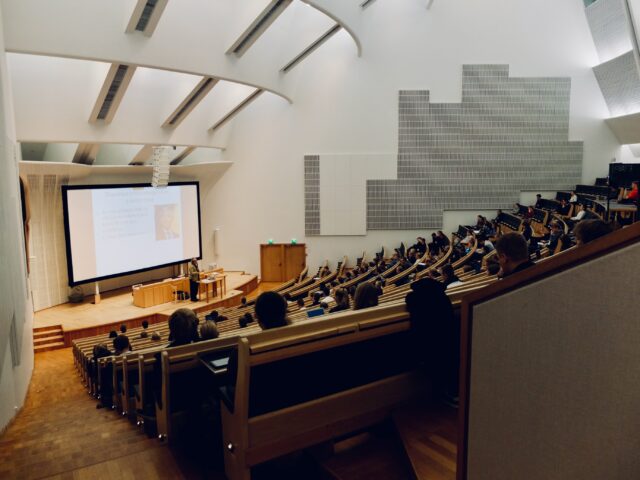Toronto Metropolitan University has announced that it will be opening its new School of Medicine in 2025 in Brampton, Ontario. The School will be housed in the Bramalea Civic Centre, which is strategically located near hospitals, public transportation, and highway systems. The City of Brampton will be contributing $20M to renovate the space, which will support the learning of 80 undergraduate and 95 postgraduate students. “We are committed to creating a school of medicine to meet the diverse needs of the Brampton and Peel Region community and today, with a location secured, we are one step closer,” said TMU President Mohamed Lachemi.

Top Ten News
January 31, 2023
“If the last few years have taught us anything, it’s that the world — and the global economy — can go through seismic shifts in a relatively short amount of time,” writes University of Alberta President Bill Flanagan in an editorial for the Edmonton Journal. Flanagan draws on recent labour market and economic reports about Alberta, as well as the projected growing number of high school graduates, to argue that it is the ideal time to invest in postsecondary education. Flanagan notes that, as part of UAlberta’s push to grow and support the province’s workforce, the university has recently proposed a plan to the provincial government to grow by 3,500 students and reach over 50,000 students by 2026.
Strikes have begun at Memorial University and Cape Breton University, while the threat of a strike has begun to loom on the campuses of Saint Mary’s University and Université du Québec à Rimouski. The Memorial University of Newfoundland Faculty Association (MUNFA) is officially on strike. As a result, classes taught by MUNFA members have been cancelled and in-person access to the Student Aid Office at Coughlan College has been suspended temporarily. Cape Breton University Faculty Association members have begun a strike and are calling for a pay raise and changes for how the university deals with international students. CBC reports that faculty strikes may be looming at SMU, where full-time faculty voted 98% in favour of a strike mandate last week, as well as at UQAR, where 94% of the Syndicat des professeurs et des professeures de l’UQAR voted in favour of a strike mandate.
Algoma University, St Stephen’s University, and Horizon College & Seminary have made new announcements about how they will be expanding their graduate programming. AlgomaU has announced its first stand-alone graduate degree, a Master of Science in Biology, and indicated that other graduate programs in computer science and social work are being considered for the future. SSU has announced that it will be refocusing on its educational mission by suspending its baccalaureate programs and expanding its online graduate education programs. The university will be launching new degree and certificate programs in peace and justice, theology and culture, ministry, and reconciliation studies. Its authority to offer a baccalaureate degree will be unaffected by the program suspension. Horizon announced the launch of two degree programs–a Master of Arts in Biblical & Theological Studies and a Master of Divinity–that are intended to help seminary students serve the church with greater knowledge, discernment, and proficiency.
In a new article from the University of Waterloo, UWaterloo Professor Dr Marcel O’Gorman comments on ChatGPT and how it has impacted education. Much of the conversation around ChatGPT tends to revolve around the “disruption” it has brought with it, and O’Gorman encourages educators to consider both the benefits and potential negative effects of that disruption. In the classroom, O’Gorman explains that there are straightforward solutions to student abuse of the ChatGPT tool, such as adapting assessments to have students create something based on coursework and then analyze and evaluate what they have made. “You can’t ChatGPT that, because it’s a unique object in the world and students are doing novel work,” says O’Gorman.
The University of Victoria has announced that it will be redeveloping the Ian Stewart Complex into a mixed-use development. The redevelopment will transform nine acres into a mixed-use university district with commercial space and housing for the community. “Over the last couple of years, as we all know, housing has become more and more of an issue both in the region, as well as in the province,” said Mike Wilson, UVic director of campus planning and sustainability. “We hope to provide this site as an opportunity to provide housing solutions and more supply in the region.” Some community members have expressed concern about the loss of an ice rink, but Chek News reports that the rink has lasted beyond its expected lifespan and will be available to its users until 2026.
In a recent article for University World News, Libing Wang discusses how higher education could be delivered in a streamlined, efficient manner through a micro-learning ecosystem. Wang argues that shortening and unbundling qualification programs into smaller learning units or micro-credential programs that can be stacked into larger qualifications would provide students with a way to gain relevant, adaptable education. Wang shares that the risk of fragmentation that comes with unbundling can be avoided by creating common frameworks. This framework can then lead to the benefits that come with developing a credit bank network, outsourcing program learning to different providers while being able to easily validate micro-learning experiences, and aligning national quality standards between countries.
A 20-year-old man has been charged with arson following a fire at a McMaster University residence on Saturday that led to student evacuations and an estimated $250K in damages. Police say that the 20-year-old “set fire to an individual room” in a unit at Bates Residence. Fire crews were able to contain the fire to the apartment and extinguish it quickly, but the blaze caused “heavy to moderate” smoke throughout the building. All residents self-evacuated and no injuries were reported. Most students were able to return to their units after the building was deemed safe on Saturday, though eight students have temporarily been relocated on campus. “That anyone would set a deliberate fire is deeply disturbing, especially in a student residence,” said McMaster Dean of Students Sean Van Koughnett.
The Saskatchewan Government Employees Union (SGEU), which represents workers at Cumberland College and Parkland College, is calling for more transparency and collaboration as the colleges move forward with their merger. In a statement, SGEU outlined member concerns such as job loss; changes to workloads; and the impact the merger may have on students, business, and communities. SGEU President Tracey Sauer said that “the two colleges’ board of governors has not been forthcoming with evidence to show a merger is in the best interests of the students, staff, businesses, residents, and communities in the area.” Sauer called for more transparent and open evidence regarding the decision as well as a detailed plan for the merged college.
While many faculty members have focused on ChatGPT’s implications for student writing and assignments, James M Lang and Michelle D Miller encourage academics to consider the lesson offered by ChatGPT about their own writing. Noting the similarities in the impersonal, objective style used by many academics and the AI alike, Lang and Miller encourage academics to develop a warmer, distinctive writing voice. This distinctive writing voice – one that demonstrates passion for a topic, tells stories effectively, resists dumping evidence on a reader, and avoids heavy hedging and buffering statements – is particularly successful when attempting to reach a broader audience. “It’s not easy to write like a human, especially now, when AI or the worn-in grooves of scholarly habits are right there at hand,” they conclude. “Resist the temptation to produce robotic prose, though, and you’ll find that you’re reaching new human readers, in the way that only human writers can.”
